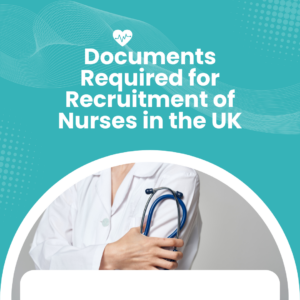Documents Required for Recruitment of Nurses in the UK: A Comprehensive Guide
Securing a nursing job in the UK as an international nurse can be an exciting and fulfilling step in your career. However, understanding the documents required for recruitment of nurses in the UK is essential for a smooth application process. Each document you submit plays a critical role in verifying your qualifications, professional experience, and eligibility to work in the UK. Here’s a guide to help you understand and prepare all necessary documents.

1. Educational Qualification Certificates
The first requirement for aspiring nurses in the UK is to submit proof of your educational qualifications. This includes:
- Nursing degree or diploma: Your nursing diploma or degree certificates must be from a recognized institution.
- Academic transcripts: Provide detailed academic transcripts from your nursing program, which will validate the courses and training you’ve completed.
The Nursing and Midwifery Council (NMC) in the UK will review these documents to ensure your education meets the necessary standards.
2. English Language Proficiency
International nurses must demonstrate proficiency in English. Accepted tests include:
- International English Language Testing System (IELTS): You typically need a minimum score of 7.0 in reading, speaking, and listening, and 6.5 in writing.
- Occupational English Test (OET): An alternative to IELTS, this test focuses on healthcare-related English, with similar scoring requirements.
Proof of English proficiency is a mandatory part of the documents required for recruitment of nurses in the UK.
3. Valid Passport and Visa Documents
A valid passport is essential for any international application. Additionally, securing a UK work visa is a significant step in your recruitment journey. Generally, the Tier 2 (General) Visa is suitable for nurses. Some of the key documents you’ll need include:
- Passport with at least six months’ validity.
- Offer letter from a UK employer.
- Certificate of Sponsorship (COS) issued by your employer, proving that they have sponsored your work permit.
4. Nursing and Midwifery Council (NMC) Registration
Before you can practice in the UK, you must register with the Nursing and Midwifery Council (NMC). The NMC requires several documents to verify your credentials, such as:
- Proof of identity: Passport or another government-issued ID.
- Qualification certificates: Validated copies of your nursing degrees or diplomas.
- Proof of good character and health: This may include police clearance certificates from your home country and a medical fitness certificate.
The NMC registration involves additional steps, such as the Computer-Based Test (CBT) and the Objective Structured Clinical Examination (OSCE) to assess your clinical knowledge and skills.
5. Police Clearance Certificate
A Police Clearance Certificate (PCC) is required to verify that you have no criminal record. This certificate should come from every country you have lived in for the past ten years (or at least from your home country if you’ve lived elsewhere for a shorter period). This document is crucial for ensuring patient safety and meeting UK healthcare standards.
6. Proof of Previous Employment and Professional Experience
The NMC and UK employers expect to see a detailed account of your previous nursing experience. You’ll need:
- Letters from previous employers verifying your employment history.
- Professional references who can vouch for your skills, ethics, and experience as a nurse.
Ensure these documents are on official letterhead, dated, and signed by a supervisor or HR representative, as they will be thoroughly verified.
7. Health and Immunization Records
To protect patients, the UK healthcare system requires all staff to be fully vaccinated against certain diseases. Required immunizations typically include:
- Hepatitis B
- Tuberculosis (TB) screening
- MMR (Measles, Mumps, and Rubella) vaccination
In some cases, additional vaccinations may be necessary. Confirm the list of required immunizations with your prospective employer or the NMC, and ensure that you keep a record of all vaccinations.
8. Resume and Cover Letter
Your resume and cover letter provide a quick overview of your skills, qualifications, and experience, tailored to the UK healthcare setting. Highlight your skills, professional background, and commitment to high-quality patient care.
A well-crafted resume and cover letter will showcase your dedication and suitability for a nursing role in the UK.
Conclusion
Securing a nursing position in the UK requires thorough preparation and attention to the documents required for recruitment of nurses in the UK. Each document verifies a crucial aspect of your background, from qualifications and language skills to health and character checks. Gathering these documents and ensuring they meet UK standards will greatly enhance your chances of a successful application.


Leave a Reply
Want to join the discussion?Feel free to contribute!